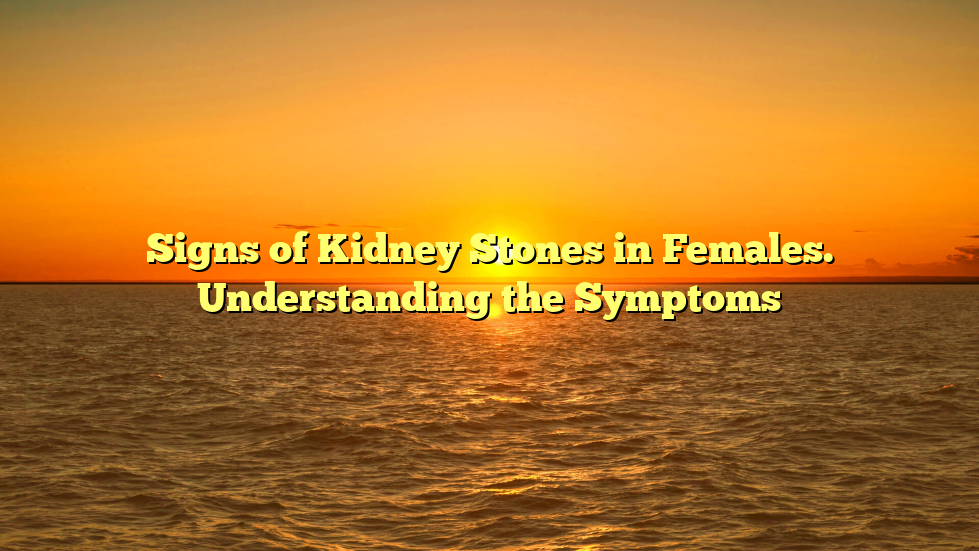Kidney stones are a common and painful condition that can affect anyone, including females. While both men and women can develop kidney stones, females may experience certain unique symptoms. In this blog post, we will explore the signs of kidney stones in females, helping you understand the symptoms to watch out for and seek timely medical intervention.
See More Chicken Coop Sign
1. Understanding Kidney Stones
Before delving into the signs and symptoms, it’s essential to have a basic understanding of kidney stones. Kidney stones are hard deposits that form in the kidneys when certain substances, such as calcium, oxalate, and uric acid, become concentrated. These deposits can vary in size and shape, ranging from tiny grains to larger, more jagged stones.
2. Common Symptoms of Kidney Stones
-
Intense Pain. One of the most prominent symptoms of kidney stones in females is excruciating pain. This pain often originates in the back or side area below the ribs and can radiate to the lower abdomen or groin. The intensity of the pain may fluctuate and can be accompanied by waves of discomfort.
See more Product at Memorial Sign World
-
Urinary Changes. Females with kidney stones may notice changes in their urinary patterns. This can include increased urgency to urinate, frequent urination, or a persistent feeling of incomplete bladder emptying. Additionally, blood may be visible in the urine (hematuria), giving it a pink or reddish tint.
-
Cloudy or Foul-Smelling Urine. Kidney stones can sometimes cause urine to appear cloudy or have an unpleasant odor. This change in urine characteristics is often indicative of an underlying issue, such as an infection or presence of crystals.
See More Memorial Sign World Articles: -
Nausea and Vomiting. Some females with kidney stones may experience nausea, vomiting, or a general feeling of unease. These symptoms can be attributed to the severe pain associated with kidney stone episodes.
-
Discomfort during Urination. Kidney stones can irritate the urinary tract, leading to discomfort or a burning sensation while urinating. This symptom should not be ignored, as it could indicate an infection or obstruction caused by the stone.
-
Fever and Chills. In certain cases, kidney stones can trigger an infection, resulting in fever and chills. If you experience these symptoms alongside any of the other signs mentioned, it’s crucial to seek medical attention promptly.
3. Unique Symptoms in Females
While many kidney stone symptoms are similar between males and females, there are a few distinctive signs that women may experience:
-
Pelvic Pain. Females with kidney stones may experience pelvic pain in addition to the usual back or side pain. This pain can feel deep and intense, mimicking symptoms of other conditions like urinary tract infections or gynecological issues.
-
Increased Urinary Tract Infections (UTIs). Kidney stones can create a suitable environment for bacteria to thrive, leading to an increased risk of urinary tract infections in females. If you notice recurrent UTIs alongside symptoms like flank pain or blood in urine, consult your healthcare provider for further evaluation.
-
Vaginal Discharge. In some cases, kidney stones can cause irritation and inflammation in the urinary tract, leading to changes in vaginal discharge. If you observe any unusual discharge alongside other kidney stone symptoms, it’s essential to consult your doctor for proper diagnosis.
4. When to Seek Medical Attention
If you experience any of the signs and symptoms mentioned above, it’s crucial to seek medical attention promptly. While some small kidney stones may pass on their own, larger stones or those causing severe symptoms may require intervention from a healthcare professional.
Additionally, it’s important to note that some symptoms can overlap with other medical conditions, such as urinary tract infections or ovarian cysts. Therefore, a proper diagnosis is necessary to determine the underlying cause and provide appropriate treatment.
5. Diagnosis and Treatment Options
When you visit your healthcare provider with suspected kidney stones, they will likely perform several tests to diagnose the condition accurately. These may include:
-
Imaging Tests. Imaging tests like X-rays, CT scans, or ultrasounds can help visualize the presence and location of kidney stones.
-
Urine Analysis. A urine sample will be analyzed for the presence of blood, crystals, or signs of infection.
Treatment options for kidney stones may vary depending on factors such as stone size, location, and severity of symptoms. Common treatment approaches include:
-
Increased Fluid Intake. Drinking plenty of water can help flush out smaller kidney stones naturally.
-
Medications. Pain medications may be prescribed to manage discomfort during stone passage. Additionally, medications can be used to assist in stone dissolution or prevention of further stone formation.
-
Extracorporeal Shock Wave Lithotripsy (ESWL). This non-invasive procedure uses shock waves to break larger stones into smaller pieces that can be passed more easily.
-
Surgical Interventions. In certain cases where other treatment methods are ineffective or unsuitable, surgical interventions like ureteroscopy or percutaneous nephrolithotomy may be necessary.
Conclusion:
Recognizing the signs of kidney stones in females is vital for early detection and timely treatment. If you experience any symptoms mentioned in this blog post or have concerns about your urinary health, it’s crucial to consult your healthcare provider for proper evaluation. Remember, prevention is always better than cure – drinking an adequate amount of water daily and maintaining a healthy lifestyle can help reduce the risk of developing kidney stones.
#memorialsignworld, #memorialsignworldstore,#MetalMonogramSigns, #PetMemorialCanvas, #ChickenCoopSign/

